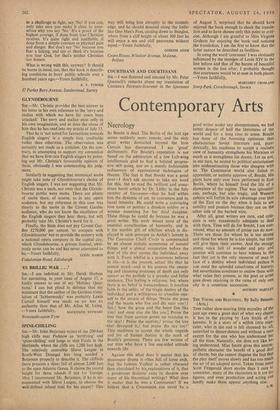Contemporary Arts
Necrology
So Brecht is dead. The Berlin of the jazz age seems suddenly more remote, and the only great writer domiciled beyond the Iron Curtain has disappeared. I say 'great' deliberately. For Brecht's reputation is not based on the admiration of a few Left-wing intellectuals glad to find a belated progres- sive still going, nor on a merely fashionable rediscovery of expressionist techniques of theatre. The fact is that Brecht was a great poet—I don't ask anyone to take my word for this, but to read the brilliant and some- times harsh article by Dr. Lfithy in the July number of Encounter—that he had within him the dynamic of art, its coarseness and its banal intensity. He could write a convincing love scene or portray a drunken soldier or a woman mourning for her dead daughter. These things he could do because he was a great writer. His work misses none of the essential complication of • humanity, and in it the terrible gift of nihilism which is dis- played in such passages as Azdak's lament in The Caucasian Chalk Circle is compensated by an almost ecstatic acceptance of natural things, and a stoical resignation before the flow of life that carries the individual away with it. Every nihilist is a passionate believer in life—it is the present, actual life that he cannot stand—and in his cosmos the sweep- ing and cleansing processes of death can only appear as the prelude to a grander and fuller existence. This feeling is religious, but, where there is no belief in transcendence, it involves faith in the utility of the tragic destiny of the individual and a willingness to abandon one- self to the stream of things. 'Praise the grass and the beasts who live and die near you I / Sec,/ how the grass and the beast live like you/ and must also die like you.II Praise the tree that from carrion grows up rejoicing to the sky! / Praise the carrion,/ praise the tree that devoured it,/ but praise the sky too!' This readiness to accept the whole anguish and joy of human destiny is the mark of Brecht's greatness. There are few writers of our time who have a less one-sided attitude towards life.
Against this what does it matter that his picaresque drama is often full of loose ends, that the famous V-effect is rather obscured than elucidated by his,explanations of it, that a ponderous dialectic casts its shadow over many of his theoretical writings? What does it matter that he was a Communist? If we believe that a Communist can never be a
good writer under' any circumstances, we had better despair of half the literatures of the world and for a long time to come. Brecht has none of the bouncing optimism that characterises Soviet literature and, para- doxically, his readiness to accept a realistic view of humanity strengthens his Marxism as much as it strengthens his drama. Let us not, in our turn, be misled by political sectarianism into underestimating those who disagree with us. The Communist world also failed to appreciate, or entirely approve of, Brecht. His plays have only ever been performed in East Berlin, where he himself lived the life of a showpiece of the regime. That was ignomini- ous, perhaps, but also tragic, and Western culture will forfeit its sole advantage over that of the East on the day when it fails to see nobility and passion because they are on the other side of the barbed wire.
After all, great writers are rare, and criti- cism is only occasionally adequate to deal with them. Time will do for Brecht, I am con- vinced, what no amount of praise can do now. There are those for whom he is too strong and those for whom he is too simple, but time will give them their answer. And the strange ironic voice full of wonder and pity and passion will continue to bear witness to the fact that art is the only resource of man face of a destiny where individual pathos is lost amid the ,splendid cataclysms of history. but nevertheless continues to endow them with what value they possess, as the poet or artist goes, down rejoicing in the ruins of only one city in a countless succession.
ANTHONY HARTLEY


























 Previous page
Previous page